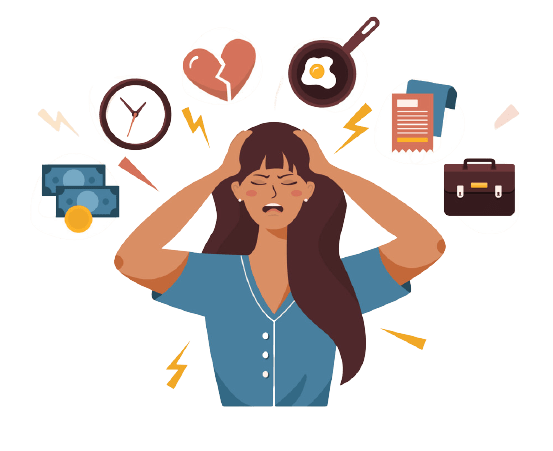Online Self-Harm Therapy | Best therapist For Self-Harm Help
- Set up a free & confidential chat on your self-harm issues
- Unlimited help through depression self-care app
- Live Video or Chat sessions with top self-harm therapists
Begin Therapy
Consult online with best Therapist
Get the Best Help for Self-Harm
TherapyMantra is here to help you on your path to recovery from self-harm issues. We match you with the best Self-Harm therapists available 24/7 via video call or messages.
Match with Self-Harm Issues Therapists
We assign the best counselors experienced in Self-Harm issues based on your needs.
Affordable and Effective
Our online sessions are 90% less expensive than in-person therapy, available 24/7.
Self-Care for Self-Harm Issues
We offer ongoing Self-Harm support through self-care tools, teen help videos, chat groups, meditations, breathing exercises, and other resources.

Wondering if it’s just a phase or something more? Take our Free online self-harm test to find out?
How it works?
You are matched with a Self-Harm counselor based on your needs and preferences. You get a secure “therapy room” where you can communicate with your counselor via chat or phone. You can write or talk about self-harm issues & ask questions to deal with Self-Harm issues.

Register for Self-harm Counseling
Simply complete a 5-minute online form to tell us about your Self-Harm issues

Consult with your Self-Harm Therapist
We connect you with Self-Harm counselors who are available 24/7 based on your preferences and needs.

Connect to Our App
Apart from Video/chat sessions, our app offers self-care tools, videos, and meditations to help you deal with your Self-Harm issues.
Best Self-Harm Issues Therapists
Positive conversations, exercises, and meditations are used by TherapyMantra psychologists to help you deal with Self-Harm issues. Our self-harm issues therapists outperform traditional counseling as you get matched from a pool of 500+ self-harm counselors, who offer 24/7 unrestricted private chat.








What Is Self-Harm?
Self-harm is the act of deliberately harming yourself. It can involve cutting, burning, or hitting your body.
Self-harm is a term that refers to any act of injury done to one’s self. It can be anything from cutting, burning, or even pulling out hair strand by strand. Some people who engage in this behavior do it because they feel like they need the pain to show how much they are suffering on the inside. Other times, it is used as a coping mechanism for stress and anxiety that has built up over time.
There can be many signs that someone is self-harming. If you are worried that a loved one may be harming themselves, look for behaviors such as cutting oneself, excessive scratching, bruising easily, or wearing long sleeves and pants even in hot weather.
The reasons when someone chooses to self-harm are complex and unique to each individual. There is no one answer that fits everyone. However, some of the most common reasons include wanting to punish oneself, trying to cope with overwhelming emotions, or feeling like there is no other way out.
Types of Self-Harm
There are many types of self-harm.
Some of the most common ones are:
Cutting
Cutting is one of the most well-known forms of self-harm. It involves using a sharp object to make shallow cuts on your skin.
Burning
Burning oneself can involve anything from setting oneself on fire to using hot objects like irons or curling irons.
Punching/Hitting
This type of self-harm usually involves hitting yourself with your fist, but can also include banging your head against a wall or other hard surface.
Biting
Biting oneself is often done with the intention of breaking the skin and drawing blood.
Pulling Out Hair
This is a form of self-harm that can cause significant damage if it goes on for a long period of time.
Overdosing
This type of self-harm involves taking any kind of pills or drugs with the purpose of harming yourself in an extreme way.
Treatments For Self-Harm
There are different types of treatment depending on person to person:
A mental health professional who specializes in self-harm can assist with treatment. This is often done through therapy and sometimes medications to help treat underlying issues such as depression or anxiety.
Medications
Medications are often used to treat underlying issues such as depression or anxiety. There are different types of medications that can be used depending on the person’s needs. These medications can be used with or without therapy.
Therapy
Therapy is often a key part of treatment for self-harm. A therapist will work with you to help identify the reasons why you are harming yourself and find healthier ways to cope with your emotions.
Support Groups
There are also support groups available for people who struggle with self-harm. These groups provide a safe space for people to share their experiences and offer support to one another.
Lifestyle Changes
Sometimes the best treatment for self-harm is to make some changes in your lifestyle. Getting more exercise or participating in an activity that you enjoy can help distract you from negative thoughts and emotions.
How Does Therapy Help In Self-Harm?
Therapy can help in self-harm by identifying the reasons why you are harming yourself and finding healthier ways to cope with your emotions. A therapist will work with you to find solutions that work best for you. They can also provide support and guidance through the healing process.
Therapy is often a key part of treatment for self-harm. A therapist will work with you to help identify the reasons why you are harming yourself and find healthier ways to cope with your emotions.
Therapies help by identifying the reasons why you are harming yourself and finding healthier ways to cope with your emotions. A therapist will work with you to find solutions that work best for you. They can also provide support and guidance through the healing process.
Therapy Options For Self-Harm
There are some different types of therapies that can be used to treat self-harm:
Cognitive Behavioural Therapy (CBT)
This type of therapy focuses on identifying negative thoughts and replacing them with more positive ones in order to change unhealthy behaviors and patterns. It is very active, meaning you will need a therapist who is willing to work hard alongside you during your sessions together. CBT encourages taking small steps towards long-term goals so it may take some time before seeing major changes in behavior but it has been shown to have long-lasting effects.
Dialectical Behavior Therapy (DBT)
This type of therapy was originally developed to treat people with Borderline Personality Disorder but has been found to be helpful for a wide range of issues including self-harm. It is based on the idea that there are two main parts to our personality: the emotional and rational parts. DBT aims to help people find a balance between these two parts.
Art Therapy
This type of therapy uses different forms of art, such as painting, drawing, or sculpting, as a way to express emotions and work through difficult thoughts and feelings. It can be helpful for people who have difficulty communicating verbally.
Group Therapy
Group therapy involves meeting with a group of other people who also struggle with self-harm. This can be a helpful way to share experiences and get support from others who understand what you are going through.
Family Therapy
Family therapy is a type of therapy that involves your whole family. It can be helpful for families who are struggling to cope with a loved one’s self-harm.
Individual Therapy
Individual therapy involves meeting with a therapist one-on-one. This can be helpful if self-harm is affecting your relationship with others or if you prefer to keep your personal issues between just yourself and the therapist.
How To Find a Self-Harm Therapist?
TherapyMantra can help you find a self-harm therapist near you. We have over 500+ therapists listed on our therapist directory. You can follow the following steps to find a good self-harm therapist:
- First, ask your family doctor or anyone else you are seeing for a referral for a self-harm therapist.
- The next thing you’ll want to do is ask your friends and loved ones for referrals.
- The next thing you’ll want to do is look online. There are many websites that help people find therapists in their area who can treat things like self-harm issues.
10,000+ Happy & Healed patients

“Due to depression all my life, I had self-harm thoughts. TherapyMantra has helped me come out of it. They really helped me to overcome these issues. ”
Kevin,
1 year on TherapyMantra
FAQs
Self-injury is not as common as conditions like anxiety or depression, but it is estimated that around one in five people engages in some form of self-harming behavior at some point in their lives.
Self-injury is not listed as an official diagnosis in the DSM (Diagnostic and Statistical Manual of Mental Disorders). However, it can be diagnosed under different categories. For example, some people who engage in self-harm may also meet the criteria for Borderline Personality Disorder or Major Depressive Disorder.
Self-harm is not always a suicide attempt, but it can be a warning sign that someone is thinking about suicide. People who self-harm often do so because they are feeling desperate and hopeless and see self-injury as the only way to escape their pain.
It is not that easy to simply “stop” harming oneself. There are usually many reasons why someone has turned to self-injury as a coping mechanism and these need to be addressed in order for healing to take place. A therapist can help you explore the underlying issues fueling your self-harm and provide support in finding healthier ways to cope.
Self-injury is not considered to be a mental illness in and of itself. However, it can be symptomatic of other mental health conditions such as Borderline Personality Disorder or Major Depressive Disorder.
Yes, self-harm can cause physical damage. People who injure themselves often do so superficially in order to avoid causing too much damage, but there is still the risk for serious injury. In addition, those who self-harm are also at an increased risk for contracting infections from the wounds.
If you are struggling with self-harm, please reach out for help. There are many resources available, including therapists who specialize in trauma and crisis management as well as online support groups where you can connect with others struggling with self-harm.


